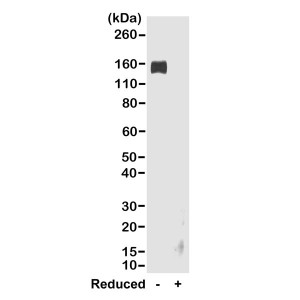anti-IgG Fc (rabbit) Goat Monoclonal (RMG02)
| Code | Size | Price |
|---|
| REV-41-1015-00-C100 | 100 ug | £511.00 |
Quantity:
Prices exclude any Taxes / VAT
Overview
Antibody Isotype: Goat IgG
Antibody Clonality: Recombinant Antibody
Antibody Clone: RMG02
Regulatory Status: RUO
Target Species: Rabbit
Applications:
- Enzyme-Linked Immunosorbent Assay (ELISA)
- Fluorescence-activated cell sorting (FACS)
- Immunocytochemistry (ICC)
- Immunohistochemistry (IHC)
- Immunoprecipitation (IP)
- Western Blot (WB)
Shipping:
Blue Ice
Storage:
+4°C
Images
Documents
Further Information
Alternate Names/Synonyms:
Immunoglobulin G
Concentration:
1 mg/ml
EClass:
32160000
Form (Short):
liquid
Formulation:
Liquid. 50% Glycerol/PBS with 1% BSA and 0.09% sodium azide.
Handling Advice:
Avoid freeze/thaw cycles.
Immunogen:
Rabbit IgG.
Long Description:
Recombinant Antibody. This antibody reacts to the Fc region of Rabbit IgG. No cross reactivity with human IgG, rat IgG, or mouse IgG. Applications: WB (nonreduced), IP, ICC, IHC, FACS, ELISA. Source: Goat. Liquid. 50% Glycerol/PBS with 1% BSA and 0.09% sodium azide. Immunoglobulin G (IgG), a monomer, is the predominant Ig class present in serum. Produced as part of the secondary immune response to an antigen, this class of immunoglobulin constitutes approximately 75% of total serum Ig. Rabbits only have one IgG subclass with two κ light chain types K1 and K2. Because of its relative abundance and excellent specificity toward antigens, IgG is the principle antibody used in immunological research and clinical diagnostics. The common rabbit IgG isotype has a molecular weight of 150 KD, with two heavy chains (about 50 KD each) and two light chains (about 25 KD each) under the non-reducing condition. This anti-rabbit secondary antibody has well-characterized specificity for rabbit IgG immunoglobulins Fc region and is useful in the detection, sorting or purification of its specified target. In general, secondary antibodies offer increased versatility enabling users to use many detection systems (e.g. HRP, AP, fluorescence). They can also provide greater sensitivity through signal amplification as multiple secondary antibodies can bind to a single primary antibody.
NCBI, Uniprot Number:
N/A
Package Type:
Vial
Product Description:
Immunoglobulin G (IgG), a monomer, is the predominant Ig class present in serum. Produced as part of the secondary immune response to an antigen, this class of immunoglobulin constitutes approximately 75% of total serum Ig. Rabbits only have one IgG subclass with two kappa light chain types K1 and K2. Because of its relative abundance and excellent specificity toward antigens, IgG is the principle antibody used in immunological research and clinical diagnostics. The common rabbit IgG isotype has a molecular weight of 150 KD, with two heavy chains (about 50 KD each) and two light chains (about 25 KD each) under the non-reducing condition. This anti-rabbit secondary antibody has well-characterized specificity for rabbit IgG immunoglobulins Fc region and is useful in the detection, sorting or purification of its specified target. In general, secondary antibodies offer increased versatility enabling users to use many detection systems (e.g. HRP, AP, fluorescence). They can also provide greater sensitivity through signal amplification as multiple secondary antibodies can bind to a single primary antibody.
Purity:
Protein G purified.
Source / Host:
Goat
Specificity:
This antibody reacts to the Fc region of Rabbit IgG. No cross reactivity with human IgG, rat IgG, or mouse IgG.
Transportation:
Non-hazardous
UNSPSC Category:
Secondary Antibodies
UNSPSC Number:
12352203
Use & Stability:
Stable for at least 1 year after receipt when stored at -20°C.



